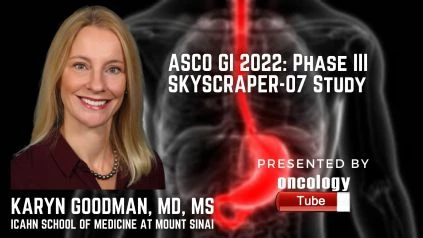Karyn A Goodman, MD, MS, Professor of Radiation Oncology, Professor of Medicine, Hematology and Medical Oncology at Icahn School of Medicine at Mount Sinai. In this video, she speaks about SKYSCRAPER-07: A phase III, randomized, double-blind, placebo-controlled study of atezolizumab with or without tiragolumab in patients with unresectable ESCC who have not progressed following definitive concurrent chemoradiotherapy.
Â
Â
Origins:
Â
Patients with unresectable, locally advanced esophageal squamous cell carcinoma (ESCC) are currently treated with definitive platinum-based concomitant chemoradiotherapy (dCRT). However, ESCC has a dismal prognosis, with more than half of tumors recurring following dCRT (Smyth et al. Nat Rev Dis Primers 2017), underscoring the need for additional treatment alternatives. In ESCC, cancer immunotherapies have shown promise, and emerging anti-TIGIT drugs like tiragolumab may help to boost the effectiveness of targeted suppression of the PD-L1/PD-1 pathway. Concurrent inhibition of the PD-L1/PD-1 and TIGIT pathways resulted in a longer lifespan in preclinical mice models compared to the single-agents. In the phase II CITYSCAPE trial (NCT03563716), tiragolumab with atezolizumab (anti-PD-L1) resulted in a clinically substantial increase in PFS and higher ORR in first-line patients with PD-L1+ (TPS 1%) metastatic NSCLC compared to atezolizumab alone (31.3 vs 16.2%). In patients with unresectable ESCC whose tumors have not progressed after dCRT, the SKYSCRAPER-07 (NCT04543617) trial will see if tiragolumab + atezolizumab combination therapy gives a better clinical benefit than atezolizumab monotherapy or placebo. In this context, we hypothesize that combination therapy will improve PFS and OS when compared to placebo.
Â
Methodologies:
Â
Patients must be over the age of 18 and have unresectable ESCC with no progressing disease (PD) after platinum-based dCRT (according to regional oncology guidelines for ESCC); ECOG PS 0–1; and no prior treatment with an immune checkpoint inhibitor. Approximately 750 patients will be randomly assigned to one of three arms: Arm A (tiragolumab 600 mg + atezolizumab 1200 mg IV Q3W), Arm B (atezolizumab 1200 mg + placebo IV Q3W), or Arm C (tiragolumab 600 mg + placebo IV Q3W) (double placebo IV Q3W). Treatment will be continued for up to 17 cycles of 21 days, or until unacceptable toxicity or radiographic PD is determined by the investigator (per RECIST v1.1). Geographic region (Asia vs. rest of world), PD-L1 expression, and staging prior to dCRT are also stratification factors (II vs III vs IV). Investigator-assessed PFS and OS are co-primary efficacy objectives, whereas independent review facility-assessed PFS and DoR are essential secondary endpoints. Analyses of safety, pharmacokinetics, biomarkers, and immunogenicity will be carried out. The hiring process is ongoing. NCT04543617 is the number for the clinical trial.

